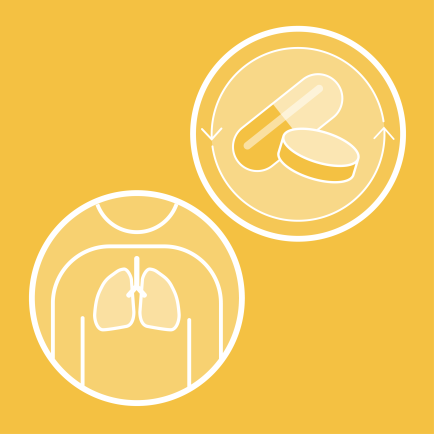Studying the Effects of Anti-fibrotic Medications on Lung Transplant Outcomes

Studying the Effects of Anti-fibrotic Medications on Lung Transplant Outcomes
Could medications designed to slow the rate of lung damage for patients with idiopathic pulmonary fibrosis (IPF) interfere with healing from lung transplant surgery? Should these anti-fibrotic medications be stopped during the period immediately prior to transplant and if so, when?
A study designed by ILD Collaborative investigators is looking for answers to these questions and more during a pilot study of the impact of anti-fibrotic medications on the outcomes of lung transplants.
A Benefit with Potential Risk?
In 2014, the FDA approved two oral medications, nintedanib and pirfenidone, for the treatment of IPF. These drugs have been shown to slow the progression of this deadly disease that scars the lungs and restricts breathing. Currently, many IPF patients awaiting lung transplantation are taking one of these two anti-fibrotic medications. But the risks and benefits of continuing these medications prior to transplant are unclear.
Earlier this year, the Interstitial Lung Disease (ILD) Collaborative began a retrospective, multi-center study searching for possible links between anti-fibrotic medication use prior to surgery and lung transplant outcomes. Researchers from eleven study sites will collect data from medical records of patients with IPF who were taking one of the anti-fibrotic medications for at least 90 days before being listed for lung transplantation between July 2015 and June 2018.
The study was designed by Peter LaCamera, MD, of St. Elizabeth’s Medical Center, and Todd Astor, MD, of Massachusetts General Hospital, who are both leading the study, and by Aliaa Barakat, PhD, who acts as a sub-investigator and is coordinating data collection and bioinformatics across the study sites. Part of the research is done in collaboration with the Patient-Centered Outcomes Research Network (PCORI), based in Washington, D.C.
Study researchers are focusing their investigation on:
- whether continuing anti-fibrotic medications until the time of lung transplant can lead to complications during or after surgery, and
- whether discontinuing the medications while waiting for a transplant results in a more rapid decline due to increased disease progression.
A Question of Timing
The study will compare differences in outcomes between patients who continued anti-fibrotic therapy up to the time of their transplant to those who discontinued the therapy at an earlier point. This timing will be critical in evaluating the possible association of these medications with problems related to healing, bleeding, or the connection of the airways between the donor lung and the recipient.
Concerns about both the risk of complications and the risk of disease progression have led to variable approaches. Physicians currently use their own judgment when deciding whether or not to stop anti-fibrotic medications before transplantation. The standard practice for some doctors is to continue medications until the day before the operation. While others may ask patients to discontinue anti-fibrotic therapy when they are placed on the lung transplant waiting list or when notified that a donor has been identified.
Also unclear is whether the medications should be used again after surgery to minimize common complications.
Future Study
Data collected from this preliminary study will allow investigators to design a future randomized clinical trial. Patients will be recruited for this research, which will focus on evaluating the safety and benefits of continuing medications until the time of transplant.
Ultimately, researchers hope to arrive at an optimal regimen for use of anti-fibrotic medications while patients are waiting for transplant surgery. The goal is to establish best practices and guidelines for patient medication use during the pre-transplant period.
Knowledge gained from these studies may help future patients maximize their survival waiting for lung transplants and contribute to successful outcomes.